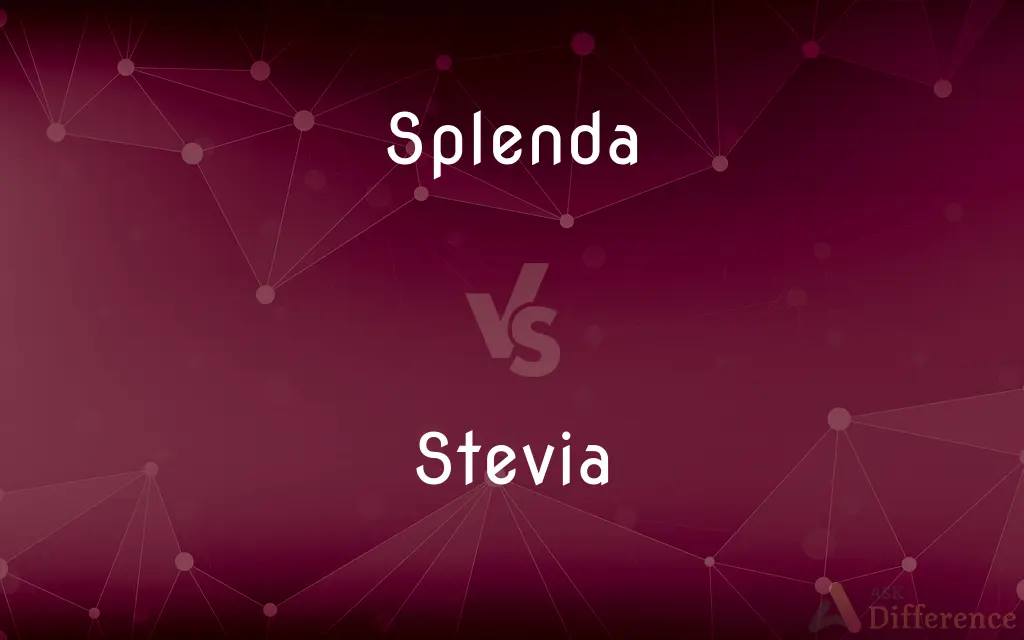Splenda vs. Stevia — What's the Difference?
By Tayyaba Rehman & Urooj Arif — Updated on April 18, 2024
Splenda is a brand-name for sucralose-based artificial sweetener, ideal for heat stability in cooking, whereas Stevia is a natural sweetener derived from the Stevia plant, noted for its no-calorie benefit.

Difference Between Splenda and Stevia
Table of Contents
ADVERTISEMENT
Key Differences
Splenda, a sucralose-based sweetener, is manufactured through a chemical process that modifies sugar molecules, making it about 600 times sweeter than sugar. Stevia, on the other hand, is derived from the leaves of the Stevia rebaudiana plant and can be up to 300 times sweeter than sugar. This fundamental difference in origin reflects in their taste profiles and how they are marketed.
While Splenda is heat stable and often preferred for baking and cooking due to its stability at high temperatures, Stevia sometimes breaks down when exposed to extensive heat. This makes Splenda a more versatile choice in recipes that require cooking or baking.
Splenda contains fillers that may contribute minimal calories when used in substantial quantities, whereas Stevia is considered a "zero-calorie" sweetener. This distinction is crucial for those monitoring calorie intake closely.
Stevia is often touted for being a "natural" sweetener, a quality that appeals to health-conscious consumers looking for natural products. Conversely, Splenda, being artificially made, might not align with the preferences of those avoiding synthetic additives.
Despite their sweetening capabilities, both Splenda and Stevia can have different aftertastes. Splenda is sometimes noted to have a more neutral aftertaste, making it similar to that of sugar, whereas Stevia might carry a slight licorice-like aftertaste, which some users find less desirable.
ADVERTISEMENT
Comparison Chart
Base Ingredient
Sucralose (derived from sugar)
Steviol glycosides (from Stevia plant)
Sweetness
About 600 times sweeter than sugar
Up to 300 times sweeter than sugar
Caloric Content
Contains minimal calories
Zero calories
Heat Stability
Stable at high temperatures
May degrade with high heat
Taste Profile
Neutral, similar to sugar
May have a slight licorice aftertaste
Compare with Definitions
Splenda
Contains fillers like maltodextrin and dextrose.
Splenda packets include additional ingredients for volume.
Stevia
May have a distinctive aftertaste compared to other sweeteners.
Stevia's unique flavor profile can influence the taste of some desserts.
Splenda
A sugar substitute known for its strong heat stability.
Splenda is commonly used to sweeten coffee.
Stevia
A natural sweetener derived from the Stevia plant.
Stevia is used in herbal teas for natural sweetness.
Splenda
Can be used in a variety of cooking and baking recipes.
Splenda is a popular choice for sugar-free baking.
Stevia
Contains zero calories, making it a popular dietary choice.
Stevia is favored in low-calorie diets.
Splenda
Marketed as suitable for diabetics due to its low glycemic index.
Many diet foods contain Splenda.
Stevia
Often used in beverages and smoothies.
Add Stevia to your smoothie for a sweet touch without the calories.
Splenda
Available in granular and packet form for versatile use.
Splenda can be measured cup for cup like sugar in recipes.
Stevia
Available in liquid, powder, and granulated forms.
Liquid Stevia is convenient for sweetening drinks.
Splenda
Splenda is a global brand of sugar substitutes and reduced-calorie food products. While they are known for their original formulation containing sucralose, they also manufacture items using natural sweeteners such as stevia, monk fruit, and allulose.
Stevia
Stevia () is a natural sweetener and sugar substitute derived from the leaves of the plant species Stevia rebaudiana, native to Brazil and Paraguay.The active compounds are steviol glycosides (mainly stevioside and rebaudioside), which have 30 to 150 times the sweetness of sugar, are heat-stable, pH-stable, and not fermentable. The human body does not metabolize the glycosides in stevia, so it contains zero calories, like artificial sweeteners.
Stevia
Any of various American plants of the genus Stevia of the composite family, especially the perennial S. rebaudiana, native to Paraguay, whose leaves contain sweet-tasting glycosides.
Stevia
Any of various extracts derived from the leaves of S. rebaudiana, used as noncaloric sweeteners and flavoring agents.
Stevia
Any of the sweet herbs of genus Stevia, native to tropical and subtropical regions of South America and western North America.
Stevia
A sweetener, many times sweeter than an equal amount of sugar, extracted from Stevia rebaudiana, that can be substituted for sugar for some purposes.
Stevia
Any plant of the genus Stevia or the closely related genus Piqueria having glutinous foliage and white or purplish flowers; Central and South America
Stevia
Any plant of the genus Piqueria or the closely related genus Stevia
Common Curiosities
What is Splenda made of?
Splenda is primarily made from sucralose, a synthetic compound derived from sugar.
How is Stevia extracted?
Stevia sweetener is extracted from the leaves of the Stevia rebaudiana plant through a process of steeping the leaves in water.
Can Splenda be used by diabetics?
Yes, Splenda can be used by diabetics as it has a low glycemic index and does not spike blood sugar levels.
Is Stevia considered safe by health organizations?
Yes, Stevia is recognized as safe for consumption by major health organizations, including the FDA.
Is there a taste difference between Splenda and Stevia?
Yes, Splenda tends to have a more neutral taste, while Stevia can have a slight licorice-like aftertaste.
Does Stevia interact with any medications?
Stevia is safe and does not typically interact with medications, but it's always best to consult a healthcare provider.
Which is better for baking, Splenda or Stevia?
Splenda is generally preferred for baking due to its heat stability.
Does Splenda contribute to weight gain?
While Splenda is low in calories, excessive use of any sweeteners could potentially lead to weight gain by influencing appetite and food intake habits.
What are the common uses of Stevia?
Stevia is commonly used to sweeten teas, coffees, and desserts, especially in dietary products.
Can Stevia cause any side effects?
In some individuals, Stevia might cause mild side effects like bloating or nausea, particularly in large amounts.
Is Stevia available in different flavors?
Yes, Stevia is available in various flavors like vanilla and chocolate to enhance its versatility in recipes.
Can Splenda be used in cold beverages?
Yes, Splenda dissolves well and can be used in both hot and cold beverages.
What is the shelf life of Splenda and Stevia?
Both Splenda and Stevia have a long shelf life, typically several years when stored properly.
Which sweetener is better for a keto diet?
Both Splenda and Stevia are suitable for ketogenic diets due to their low carbohydrate content.
Is Splenda vegan?
Splenda is considered vegan as it does not contain any animal-derived ingredients.
Share Your Discovery

Previous Comparison
Flack vs. Flak
Next Comparison
Prosthesis vs. ProthesisAuthor Spotlight
Written by
Tayyaba RehmanTayyaba Rehman is a distinguished writer, currently serving as a primary contributor to askdifference.com. As a researcher in semantics and etymology, Tayyaba's passion for the complexity of languages and their distinctions has found a perfect home on the platform. Tayyaba delves into the intricacies of language, distinguishing between commonly confused words and phrases, thereby providing clarity for readers worldwide.
Co-written by
Urooj ArifUrooj is a skilled content writer at Ask Difference, known for her exceptional ability to simplify complex topics into engaging and informative content. With a passion for research and a flair for clear, concise writing, she consistently delivers articles that resonate with our diverse audience.















































